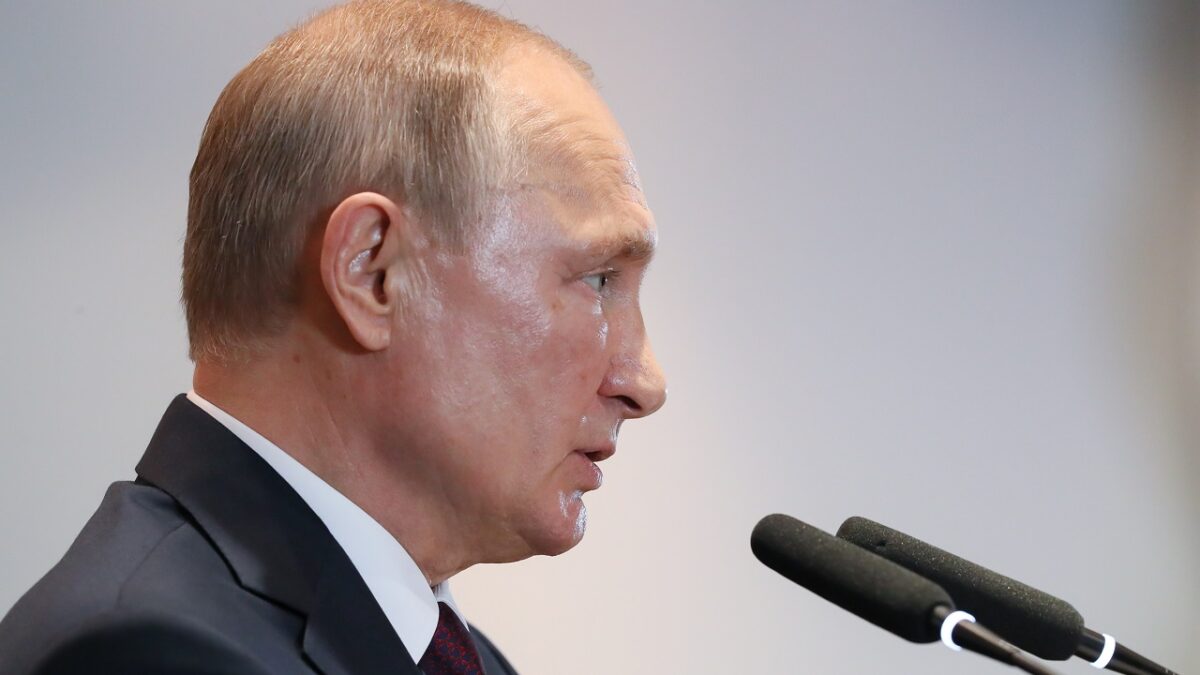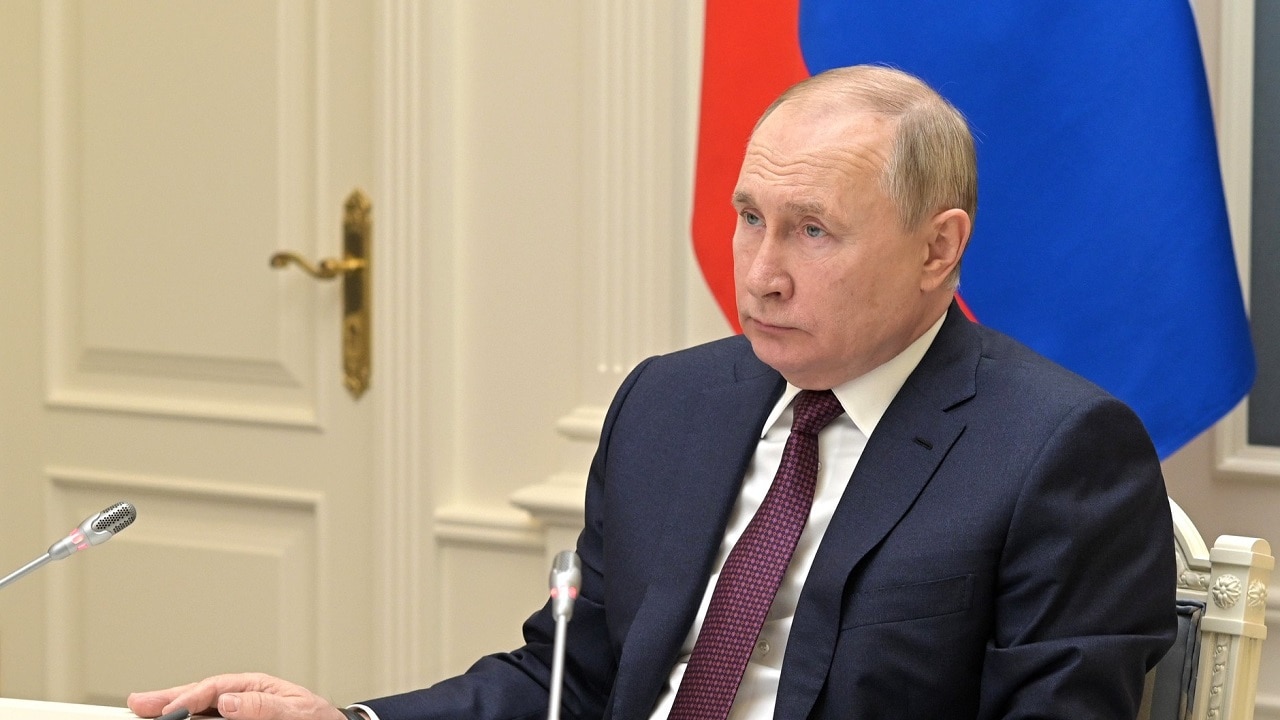With no evidence to support their claims, Russian officials are waging an international information campaign to blame Ukrainians and the West for the Crocus City Hall terror attack that left at least 145 people dead and scores more injured. To the contrary, the US government provided Russia with a highly detailed warning more than two weeks before the attack about a terrorism threat. Russian President Vladimir Putin publicly dismissed it as “outright blackmail” with the “intention to intimidate and destabilize our society.”

Russian President Putin. Image Credit: Creative Commons.
The Islamic State Khorasan (ISIS-K), an Afghanistan affiliate militant group of the Islamic State, claimed responsibility for the attack, and US intelligence has confirmed it. But the director of Russia’s Federal Security Service (FSB), Alexander Bortnikov, said three days after the attack, “We believe that the action was prepared by radical Islamists, naturally, Western security services contributed to it, and Ukrainian security services bore a direct relation.”
These responses are a stark reminder of why Putin’s Russia has never been and cannot be a credible counter-terrorism partner. There is irony in the duplicitous path Putin and company have chosen to pursue. A radical terrorist group has taken credit for an attack, and Moscow is now refusing to acknowledge this fact.
Twenty-five years ago, the opposite took place—Russian officials rushed to blame militants with no proof. In September 1999, a series of horrific apartment bombings across Russia left over 300 dead and over one thousand wounded. Russian officials immediately blamed Chechen militants. Moscow rushed to declare war on Chechnya without any transparent investigation into the attack, while credible reporting suggested that the FSB had orchestrated it. Putin’s subsequent perceived tough stance on terrorism drove up his approval ratings and propelled him out of obscurity into power.
Putin and Russian officials may have dismissed US warnings last month due to genuine distrust of the West, a focus on the war in Ukraine, or both. Russia’s FSB plays a central role domestically and within the post-Soviet space in security and intelligence gathering, as well as planning the war against Ukraine. It is possible that the FSB was too busy cracking down on internal dissent against the Kremlin and the war to focus on genuine security threats, or too scared to tell the Kremlin to take US warnings seriously. Or it could be an even more sinister explanation—one that is hard not to raise, knowing what we know about post-Soviet Russia and the 1999 apartment bombings. The Kremlin might have also seen an opportunity to boost the narrative that the West continues to attack Russia using Ukraine, as the war enters its third year. Putin needs to continue convincing Russian citizens that they are under attack from the West, and recruitment to fight in Ukraine has noticeably increased after Crocus Hall. Thus, pointing a finger at Ukraine and the West appears to have served the Kremlin’s most pressing priority.
There is little new in Putin’s Russia when it comes to terrorism and foreign policy objectives, but the West should now know better from experience. At the beginning of his presidency, Putin famously rushed to call U.S. President George W. Bush after September 11, 2001, to offer condolences, which he took at face value. Putin pushed the idea that Russia and the West faced the same terrorist threat. In subsequent years, many Western policymakers continued to believe that counter-terrorism could be one area of shared priority with Moscow. After all, Russia had suffered attacks from Islamist militants on its soil after 1999 and officially opposed ISIS. Presidents Obama and Trump both discussed cooperation with Russia against ISIS in Syria.
Such optimism was always unwarranted at best, if not self-delusional. From Chechnya to Syria to Afghanistan, Putin has done more to encourage terrorism than fight it, with Moscow maintaining ties to terrorist groups from Hamas to the Taliban and Hezbollah. Moscow never targeted ISIS with any consistency in Syria, and the brutality of its military campaigns in Chechnya and Syria only encouraged radicalization.

Vladimir Putin observes strategic deterrence forces exercise in the Kremlin’s situation room.
Russia’s security services have proven incompetent during major hostage crises, most notably in the Beslan school siege of September 2004. Their botched rescue operation led to the deaths of over 300 hostages, mostly children. Putin rewarded those involved with promotions and medals.
ISIS, for its part, likely wanted payback due to its alignment against the Taliban in Afghanistan and Russian material support to the Taliban’s elite units, and because of Russia’s campaign in Syria. It is thus hardly surprising that it now seized an opportunity to stage an attack in Russia.
At the heart of the issue is that the Kremlin believes the West is its primary adversary. Moscow has been looking for an opportunity to replay the end of the Cold war with an alternate ending. Moscow always played a double game with the West when arguing that they face the same terrorist threat. Over the years, Russian officials accused the US both in public and private of not only seeking to weaken Russia but also inventing ISIS and empowering militants across the globe. Putin indirectly accused the US of instigating the hostage crisis in Beslan. “Some would like to tear from us a ‘juicy piece of [a] pie.’ Others help them,” Putin said after the incident, “[They] help, reasoning that Russia remains one of the world’s major nuclear powers, and, as such, still represents a threat to them. And so they reason that this threat should be removed. Terrorism, of course, is just an instrument to achieve these aims.” It was understood he was referring to the United States. Years later, Russia openly accused the U.S. of aiding Chechen rebels during the second Chechen war, which was declared after the 1999 apartment bombings.
It may be tempting to return to the idea that counter-terrorism is one area where Moscow and the West can find common ground, especially as Western policymakers naively seek “off-ramps” for Russia in Ukraine. We may not know precisely why Putin chose to ignore intelligence warnings last month. But Moscow’s laying blame on Ukraine and the West for the terrorist attack should leave no room for doubt that Putin remains committed to a bigger war. He will align with anyone if it helps him achieve his aims. Returning to the idea counterterrorism offers an area of common ground between the West and Russia will continue to be self-defeating.
About the Author:
Anna Borshchevskaya is a senior fellow at The Washington Institute for Near East Policy and author of “Putin’s War in Syria: Russian Foreign Policy and the Price of America’s Absence.”

